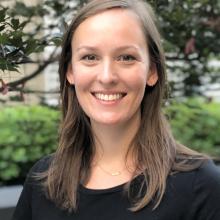June 2022 Spotlight on SRCD U.S. Federal Policy Fellow: Virginia Salo, Ph.D.
Virginia Salo is a SRCD Federal Executive Branch Policy Fellow who is placed in the Eunice Kennedy Shriver National Institute of Child Health and Human Development (NICHD), National Institutes of Health (NIH).
Through my placement at the Eunice Kennedy Shriver National Institute of Child Health and Human Development (NICHD), I have gained a wider perspective on how basic and applied developmental science can inform policy decisions and the wide range of roles developmental scientists can play in that process. I’ve come to better understand how my own research program fits into a larger picture of supporting young children and their families, and more importantly, I am learning that it takes individuals and organizations working on different timelines, from different perspectives, and at different levels of a problem to meaningfully address the needs of the communities we intend to serve.
My specific placement is on the extramural research side of NICHD, within the Child Development and Behavior Branch (CDBB). I am learning how to contribute to the broader picture primarily through scientific stewardship, including establishing (and revising) research and funding priorities while simultaneously supporting researchers on the ground who seek to answer innovative and important questions about child development through their federally funded research projects. Often this process is reactive, as was the case with research related to the COVID-19 pandemic. In the summer and fall of 2021, the national debate around masking in schools and how they affect child development and learning was at a fever pitch. In response to requests for information from lawmakers, the NICHD director asked members of my Branch for a review of the scientific evidence that might inform policy decisions around masking in schools beyond their use as a COVID-19 mitigation strategy. Observing NICHD leadership engage in outreach events geared toward sharing this information with policy makers, scientists, and the general public highlighted for me the importance of being able to clearly and concisely convey to a wide variety of audiences what is known and, critically, what is not yet known about a given topic. Perhaps more importantly, I saw that the evidence base was not sufficient to make straightforward recommendations. Science is always accumulating, and we often have a need to answer questions with insufficient or partial evidence as we work to build a research base.
While working at NICHD, I’ve become acutely aware of what a privilege and responsibility it is to be tasked with taking a bird’s eye view of the science, identifying the gaps that exist, and creating opportunities that will fill those gaps, for example through developing new funding opportunities or convening expert meetings on a topic. Although we cannot anticipate every policy question that might arise, the goal of the NICHD is to be a leader in supporting researchers to submit meritorious research applications and conduct high-quality studies, if funded, in a way that advances the entire field and supports the translation of that scientific knowledge to improve health and enhance lives. There has long been a recognized need for building strong communication between all stakeholders in the scientific enterprise to ensure the work we are supporting, the evidence drawn therefrom, and the programs and policies based on that evidence truly reflect the needs and the strengths of the communities we intend to serve. In response to this need, I am co-drafting guidance language to encourage the development of sustainable bi-directional engagement between researchers and public health and community venues. I am also leading the development of a trans-NIH workshop on socioeconomic disparities in language development aimed at addressing the fact that much of the research on the early language environment and how to support language development does not represent the communities often targeted for intervention. As I look forward to my second fellowship year (and beyond), I will continue supporting efforts to build strong communication between all stakeholders in the science while also exploring ways to be more proactive in identifying and addressing the needs of tomorrow.
Beyond expanding my perspective on how basic science and its funders fit in the broader picture, one of my favorite parts of my fellowship experience thus far has been the opportunity to meet with and learn from many different people playing different roles in the broad space of science policy. I’ve met with funders, advocates, scientists, administrators, and political appointees; individuals in leadership roles and those at the beginning of their careers, like me; people with science backgrounds and others with backgrounds in law or community organizing who’ve chosen to apply their expertise to this new-to-them world of developmental science policy. In addition to countless one-on-one interactions, I’ve had the privilege to join several inter-agency work groups. It has been inspiring and informative to see the diverse perspectives that each agency or organization brings to the table in working toward a shared goal of understanding how we can best support children and families to meet their unique goals.
Over the past several months, I’ve learned the ins and outs of NICHD and how this agency interacts with other stakeholders in the broad landscape of developmental science policy. More importantly, however, this has been a unique opportunity for me to discover how I can bring my own skills and lived experiences to best serve in this space. I am coming to terms with the hard truth that the pathway from basic science to informing policy decisions is often a long one, but I also now see basic science as one part of a much larger picture. Many people will say that the government is full of roadblocks and red tape, and while there is certainly some truth to that, with each new project, conversation, and experience afforded through this fellowship, I see new opportunities for change and progress. I look forward to continuing this journey and leveraging all that I’ve learned to advance the role research plays in the well-being of children and families.
